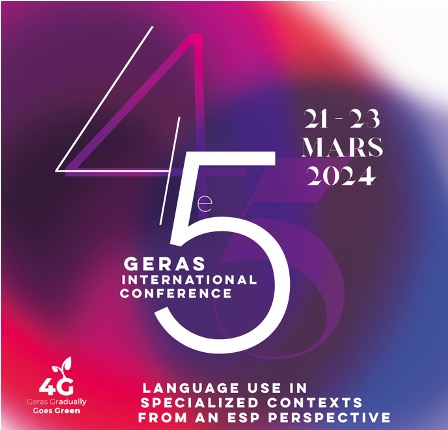
|
21-23 Mar 2024 - ZHAW Université des sciences appliquées de Zurich - département de linguistique appliquée - Winterthur (Switzerland)
|
Topic
Topic 45th GERAS international conference ZHAW Zurich University of Applied Sciences, School of Applied Linguistics, Winterthur (Switzerland)
Language use in specialized contexts: New perspectives on research in English and French as specialist languages
The observation of language use in specialized contexts in English and French has a strong transdisciplinary tradition. The expression 'uses of language' is traditionally used by researchers to emphasize that what individuals say or write is closely linked to communicative objectives or functions. Many studies also highlight the fact that the way in which speakers actually use a specialist language, whether French or English, is somewhat different from the way in which they think they use it, and even more different from the way in which they think they should use it, as shown, for example, by the most recent studies in the field of specialized French (Mourlhon-Dallies & Sowa 2023) and French for specific purposes (Mourlhon-Dallies 2019), in a world marked by increasingly characteristic social movements (van Dijk 2023). As Brown and Yule (1983) have argued, the notion of usage is broadly equivalent to that of 'discourse', a concept based on the systemic relationships between text and context. The first studies of linguistic usage in specialized contexts, gender and register studies in particular, focused mainly on the text, with context being relegated to the background as a set of factors leading to patterns of variation based on discipline or profession. Since these early studies, context has gradually been given a more important role in what constitutes the uses of a specialized language. For example, coherence and cohesion, as defined by Halliday and Hasan (1976), have proved to be powerful concepts in helping contemporary researchers to establish that text and context constitute a unified linguistic system realized in text. Triangulated approaches (Angouri 2010), which provide rich descriptions of usage through detailed analyses of contextual data, have also highlighted the central role of context in how we actually use language. Corpus-based approaches, although still fundamentally 'textual', have provided further evidence of the central role of context. For example, small corpora (Koester 2010), sometimes representing highly specialized discursive varieties, are typically sampled from contextual parameters such as specialized domains, actions and social roles. Finally, there is every reason to believe that the most recent explorations of specialized settings and cultures, as well as epistemological reflection on both concepts, will reinforce the inextricable links between text and context, as they highlight the unified nature of linguistic uses in specialized contexts. Academic and professional contexts, such as companies and international organizations, generate multilingual usage. This phenomenon has given rise to multiple small- and large-scale studies showing that English is very often used as a lingua franca (Cogo 2018). These studies shed light not only on the contextual factors of language choice, but also on the specific nature of English, as illustrated, for example, in what is known as the 'lingua franca core', a set of fundamental characteristics of the L2 in writing and/or speaking. Uses are also multimodal. Research into this aspect of usage in academic and professional contexts regularly invites researchers to consider usage as an integral part of a more general communication system in which text, images, videos and even gestures all contribute to the achievement of communication objectives. Not only does this type of study renew our knowledge of the principles of effective communication in specialised contexts, but it also encourages us to rethink the way in which uses, or literacy, is actually transmitted to learners of all kinds, whether they be university students (Dressen-Hammouda & Wigham 2022) or professionals seeking to improve their communication skills in globalised companies (Whitehouse 2023). Because of the multifaceted nature of language use in academic and professional contexts, the conference will welcome theoretical approaches, practical approaches and a combination of both. We therefore invite researchers from all disciplinary fields to address, for example, the following questions:
References Angouri, Jo. 2010. Quantitative, Qualitative or Both? Combining Methods in Linguistic Research. In Litosseliti, Lia (dir.), Research Methods in Linguistics in Linguistics 1. Continuum, 29–45. Brown, Gillian & George Yule. 1983. Discourse Analysis. Cambridge University Press. Cogo, Alessia. 2018. ELF and Multilingualism. In Jenkins, Jennifer, Will Baker & Martin Dewey (dir.), The Routledge Handbook of English as a Lingua Franca. Routledge, 357–68. Van Dijk, Teun A. 2023. Discourse and Social Movement. Routledge. Dressen-Hammouda, Dacia & Ciara Wigham. 2022. Evaluating Multimodal Literacy: Academic and Professional Interactions around Student-Produced Instructional Video Tutorials. System 105, doi: 10.1016/j.system.202.102727. Halliday, Michael Alexander Kirkwood & Ruqaiya Hasan. 1976. Cohesion in English. Longman. Koester, Almut. 2010. Building Small Specialised Corpora. In O’Keefe, Anne & Michael McCarthy (dir.), The Routledge Handbook of Corpus Linguistics. Routledge, 66–79. Mourlhon-Dallies, Florence. 2019. La didactique du FOS actuellement : renouvellement notionnel et impact sur les pratiques de cours. Points communs. Recherche en didactique des langues sur objectif(s) spécifique(s) 47, 8-29. Mourlhon-Dallies, Florence & Madgalena Sowa. 2023. Introduction : l’enseignement des langues de spécialité à l’heure de la mondialisation. Neofilolog 61(2), 5-12. Whitehouse, Marlies. 2023. Transdisciplinarity in Financial Communication. Writing for Target Readers. Palgrave Macmillan.
|

